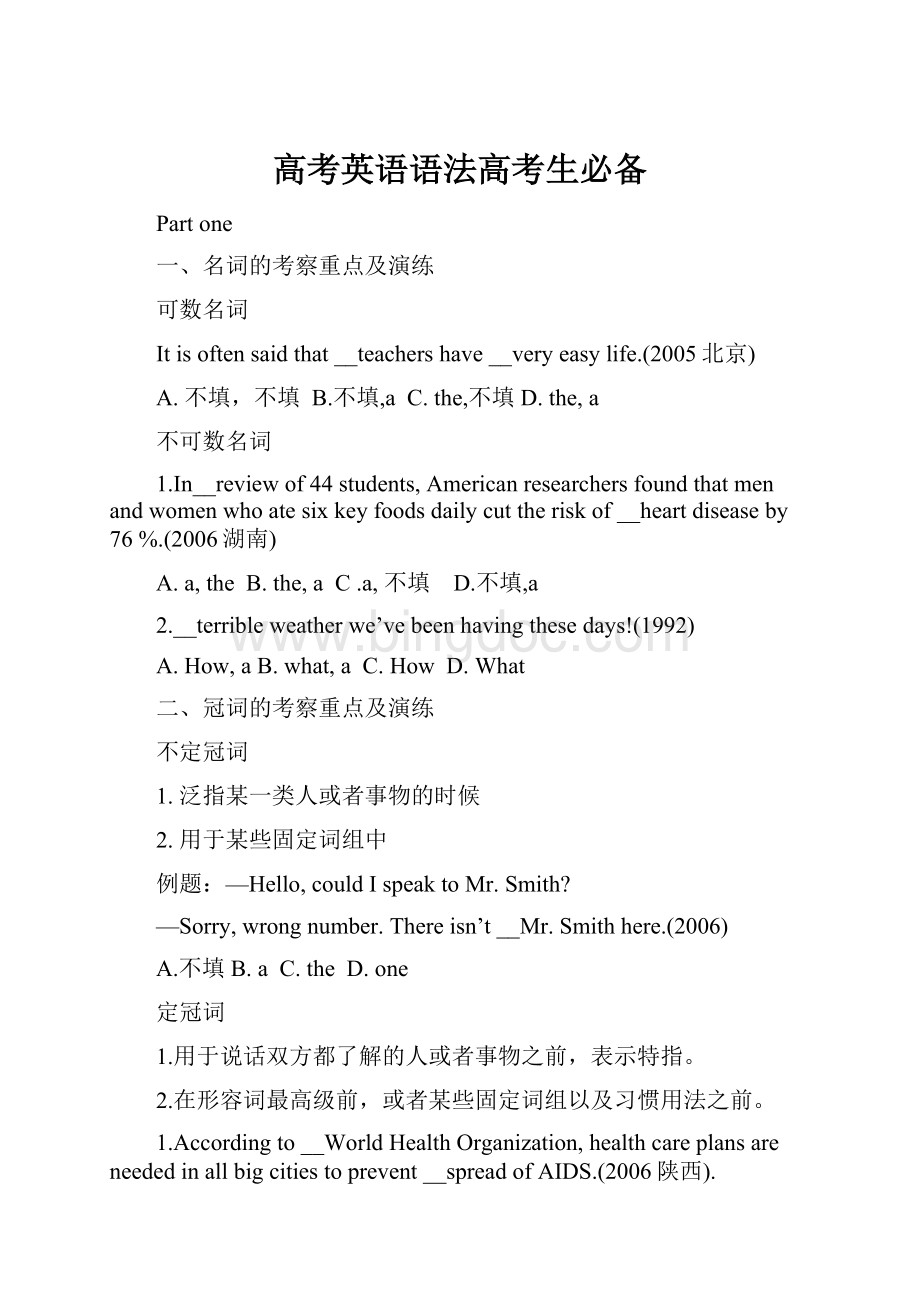高考英语语法高考生必备.docx
《高考英语语法高考生必备.docx》由会员分享,可在线阅读,更多相关《高考英语语法高考生必备.docx(29页珍藏版)》请在冰点文库上搜索。

高考英语语法高考生必备
Partone
一、名词的考察重点及演练
可数名词
Itisoftensaidthat__teachershave__veryeasylife.(2005北京)
A.不填,不填 B.不填,a C.the,不填D.the,a
不可数名词
1.In__reviewof44students,Americanresearchersfoundthatmenandwomenwhoatesixkeyfoodsdailycuttheriskof__heartdiseaseby76%.(2006湖南)
A.a,the B.the,a C.a,不填 D.不填,a
2.__terribleweatherwe’vebeenhavingthesedays!
(1992)
A.How,aB.what,a C.How D.What
二、冠词的考察重点及演练
不定冠词
1.泛指某一类人或者事物的时候
2.用于某些固定词组中
例题:
—Hello,couldIspeaktoMr.Smith?
—Sorry,wrongnumber.Thereisn’t__Mr.Smithhere.(2006)
A.不填B.a C.the D.one
定冠词
1.用于说话双方都了解的人或者事物之前,表示特指。
2.在形容词最高级前,或者某些固定词组以及习惯用法之前。
1.Accordingto__WorldHealthOrganization,healthcareplansareneededinallbigcitiestoprevent__spreadofAIDS.(2006陕西).
A.the,不填 B.the,the C.a.a D.不填,the
2.Iknow__JohnLennon,butnot__famousone.(2005山东)
A.不填,a B.a,the C.不填,the D.the,a
零冠词
1.表示泛指的不可数名词和复数名词之前用冠词
2.在用于泛指时间,表示三餐、球类或棋类运动、学科的名词以及表示季节、年份、等时间名词之前不用冠词。
3.在某些固定词组,习惯用语中,名词前不用冠词。
1.Iknowyoudon’tlike__musicverymuch.Butwhatdoyouthinkof__musicinthefilmwesawyesterday?
(2006)
A.不填,不填 B.the,the C.the,不填 D.不填,the
2.thesignreads”Incaseof___fire,breadtheglassandpush___redbutton.”
A.不填,a B.不填,the C.the,the D.a,a
3.thewarmthof___sweaterwillofcoursebedeterminedbythesortof__woolused(2001)
A.the,the B.the,不填 C.不填,the D.不填,不填
Unit2
PartOne
代词的基本用法
—Susan,goandjoinyoursistercleaningtheyard.
—Why___?
Johnissittingtheredoingnothing.(2003)
A.him B.he C.I D.me
人称代词it的特殊用途
1.指代事物或者人
Ilike____intheautumnwhentheweatherisclearandbright.(2004)
Athis Bthat Cit Done
2.充当形式主语
___isourbeliefthatimprovementsinhealthcarewillleadtoastronger,moreprosperouseconomy.(2006浙江)
A.As B.That C.This D.Itis
3.充当形式宾语
AsthebusiestwomaninNorton,shemade___herdutytolookafteralltheotherpeople’saffairsinthattown.(2006湖南)
Athis Bthat Cone Dit
4.用于“强调句型”
Itiswhatyoudoratherthanwhatyousay___matters.(2005天津)
Athat. B.what C.which D.this
指示代词的基本用法
1.通常用that或those指代前面提及的事物,而下文将要提到的事物则用this或者these来指代
Hewasnearlydrownedonce.
Whenwas_____?
_____wasin1998whenhewasinmiddleschool.
Athat,It Bthis, This Cthis,It Dthat,This
2.指示代词that,those,one,ones作替代词的用法
hat和those必须有后置定语 that和one的区别
(1)that只能替代物,one即可替代物和可替代人
(2)that必须有后置定语,而one不一定
IpreferaflatinInvernessto___inPerth,becauseIwanttolivenearmyMom’s.(2005天津)
A.one B.that C.it D.this
不定代词的基本用法
1.all,each,every
all三个或三个以上的所有 each两个或两个以上的每一个,强调个体 every三个或三个以上的每一个,强调全体
Ihadtobuy___thesebooksbecauseIdidn’tknowwhichonewasthebest.(2004上海)
A.both B.none C.neither D.all
2.noone,nothing,none
Theywereallverytired,but___ofthemwouldstoptotakearest(1995)
A.any B.some C.none D.neither
3.both,neither,either
1)Ifyoucan’tdecidewhichofthetwobookstoborrow,whydon’tyoutake__?
Iwon’treadthemthisweek.(2006浙江)
A.all B.any C.either D.both
4.someany
Don’tworryifyoucan’tcometo____party,I’llsave____cakeforyou.(2006浙江)
A.the,some B.amuch C.theany D.alittle
5.other,others,another
Bothsideshaveaccusedofbreakingthecontract____.(2006上海春)
A.another B.theother C.neither D.each
第二节其他类型的代词的用法简介
1.名词性物主代词
—IsyourcameralikeBill’sandAnn’s
—No,butit’salmostthesameas____(1994)
A.her B.yours C.them D.their
2.反身代词
—WhocalledmethismorningwhenIwasnot?
—Amancalling____Robert.(2006福建)
A.his B.himself C.his D.不填
3.疑问代词
Why!
Ihavenothingtoconfess.____youwantmetosay?
(2004上海)
A.Whatisitthat B.Whatitisthat C.HowisitthatD.Howitisthat
PartTwo
一、时态概述
态
时
一般
进行:
be+Ving
完成
Have/has+Ved
现在
一般现在时work(works)
现在进行时
am,is,are+working
现在完成时
have,hasworked
过去
一般过去时worked
过去进行时
was,were+working
过去完成时
hadworked
将来
一般将来时will(shall)work
将来进行时
will(shall)+be+working
将来完成时
Will(shall)haveworked
过去
将来
过去将来时would(should)work
例题:
1)Monthsagowesailedtenthousandmilesacrossthisopensea,which____thePacific,andwemetnostorms.(2005辽宁)
A.wascalled B.iscalled C.hadbeencalled D.hasbeencalled
2)—Yourjob____openforyourreturn.
—Thanks.(2006北京)
A.willbekept B.willkeep C.hadkept D.hadbeenkept
3)SinceIwonthebigprize,mytelephonehasn’tstoppedringing.People____toaskhowIamgoingtospendthemoney.(2005湖南)
A.phone B.willphone C.werephoning D.arephoning
4)Thecountrylifehewasusedto_____greatlysince1992。
(2005山东)
A.change B.haschanged C.changing D.havechanged
5)John,afriendofmine,whogotmarriedonlylastweek,spent$3,000morethanhe____forthewedding.(2006)
A.willplan B.hasplanned C.wouldplan D.hadplanned
二、时态综述及特殊用法
一、常用一般现在时的情况:
1.以Here或There开头的句子,说明正在发生的动作,谓语动词不用现在进行时,而用一般现在时。
如:
Herecomesthebus!
Theregoesthebell!
2.既定的时间如生日、日历、课时安排、交通时刻表等,通常用一般现在时表示将来动作。
如:
Themeetingstartsatfiveo'clock.
Thetrainleavesatthreethisafternoon.
3.在seetoit,makesure,makecertain,besure,lookout,takecare等之后的从句要用一般现在(过去、现在完成)时代替一般将来(过去将来、将来完成)时。
如:
Youmustmakesurethedoorisclosedbeforeyouleavethelab.
SeetoitthateverythingisOK.
4.在宾语从句中,表示客观事实或真理,一律用一般现在时。
如:
Theteachertaughtusyesterdaythatthemooncirclestheearth.
Somebodytoldmethatyouareawriter.
5.在由assoonas,when,before,after,till等引导的时间状语从句和由if,unless,aslongas,incase等引导的条件状语从句或在方式、让步状语从句中,常用一般现在时代替将来时,但主句用一般将来时。
如:
Ifyoucomethisafternoon,We'llhaveameeting.
Whenyoumeethim,tellhimtocometomyplace.
二、常用一般过去时的情况:
1.表示说话人始料未及的事情,用一般过去时。
如:
Oh!
Ididn'tknowyouwereinShanghai.Howlonghaveyoubeenthere?
2.在wish,wouldrather的宾语从句中和在asif引导的状语从句中,以及在Itistimethat…的定语从句中,谓语动词用一般过去时说明现在的事情。
如:
It'stimeyouhadaholiday.
Helooksasifhewereyoung.
3.用表示意愿及精神状态的动词,反映的是说话者探询的态度时,动词用一般过去时表示一般现在时,显得更加有礼貌。
如:
Ididn'tknowyouwerehere.(我不知道你在这里,were实际上指现在)
Iwonderedifyoucouldhelpme.
4.在含有hardly/scarcely…when,nosooner…than结构的句子中,主句用过去完成时,从句用一般过去时。
(注意:
主句一般倒装)如:
HardlyhadIenteredtheroom,whenIheardaloudnoise.
Nosoonerhadhereachedthedoorthanhecameback.
三、常用现在进行时的情况:
1.若句中带有always,allthetime,forever,constantly等词或短语,用进行时表示一个频繁发生的动作,表示说话人赞赏或厌恶等感情。
如:
Youarealwaysforgettingtheimportantthings.
Heisconstantlyleavinghisthingsbehind.
2.某些词,如come,go,leave,arrive,start等可用现在进行时表示将来。
Heisleavingtomorrow.
Thevisitorsarearrivinginafewminutes.
四、常用过去进行时的情况:
1.表示故事发生的背景。
如:
OnedayJoneswaswalkingalongthestreet.
Itwassnowingastheymadetheirwaytothefront.
2.与always,forever,constantly,continually,frequently等词连用,表示过去经常发生的行为,往往带有感情色彩。
如:
Mybrotherwasalwayslosinghiskey.
Theywerefrequentlyquarrelling.
五、常用现在完成时的情况:
1.被thefirsttime,afewtimes,againandagain等表示次数或重复的状语修饰时,句中常用现在完成时。
如:
Thisisthethirdtimewehavemadeimprovementsinthatequipment.
2.定语从句的先行词是最高级形式或被最高级形容词修饰时,句中常用现在完成时。
如:
Scientistshavefoundalmostallmetalsaregoodconductors,thebestofwhichissilver.
3.在某些时间状语从句和条件状语从句中,用现在完成时表示将来完成的动作。
如:
I'llgotoyourhomewhenIhavefinishedmyhomework.
Ifithasstopptedsnowinginthemorning,we'llgotothepark.
六、常用过去完成时的情况:
1.某些动词的过去完成时表示原先计划或打算做而没做的事情。
常见的动词有mean,plan,think,suppose,want,intend等。
如:
Wehadhopedthatyouwouldbeabletovisitus.
Ihadintendedtomakeacake,butIranoutoftime.
2.在条件状语从句中以及which或I'drather后的宾语从句中,常用过去完成时表示与过去事实相反的虚拟语气。
如:
Ifyouonlyhadworkedwithgreatcare!
Iwouldratheryouhadtoldherthetruth.
七、常用一般将来时的情况:
1.表示一种倾向、固有特性或说话人推测的意见。
如:
Ithinkitwillraintomorrow.
Birdswillbuildnests.
2.在某些条件状语从句、时间状语从句中。
如:
Weshallgounlessitrains.
He'llhelpyouifyouaskhim.
说明:
有时用beaboutto+动词原形或beto+动词原形或begoingto+动词原形表示将来时。
如:
Themeetingisgoingtostartatnine.
Tellhersheisnottobebacklate.
Thefilmisabouttobegin.
PartThree
一、插入隔离型
有时一个本来很简单的句子,由于表达的需
要,在其中置入一个插入成分,或将某些成分从正
常位置调入一个在同学们看来属“非正常”的位置并
造成理解困难。
1.Dorothywasalwaysspeakinghighlyofherrole
intheplay,_____,ofcourse,madetheothers
unhappy.
A.who B.which C.this D.what
2.“Eachofthestudents,workinghardathisorher
lessons,_____togotouniversity.”“SodoI.”
A.hope B.hopes C.hoping D.hoped
3.Hetoldmethenews_____,believeitornot,hehadearned$1000inasingleday.
A.that B.whichC.as D.because
二、词性误用
英语和汉语不仅在遣词造句、句型搭配、习惯
用法等方面有很大的差别,就是在词性方面也有很
大的差别,并且这种差别有时会使同学们稍不小心
就酿成错误
1.A______roadgoes______fromoneplaceto
another.
A.straight,straight B.straightly,straightly
C.straight,straightly D.straightly,straight
2.Don't_____;noonewillhurtyou.
A.afraid B.frighten C.fear D.nervous
3.Hetreatedallthepeoplearoundhim,______he
kneworhedidn'tknow,______.
A.if,friendly B.whether,friendly
C.if,inafriendlyway
D.whether,inafriendlyway
lonely(孤独的),costly(高价的,昂贵的),lively(有
生气的,生动的),lovely(可爱的,美丽的,愉快
的),orderly(整齐的,守规则的)
三、词义误解型
有许多题,因为其中有个别词(尤其是其中的
关键词)的词义很容易误解,或是同学们对这类词
理解不准,在运用时其词义在脑海中模棱两可,从
而导致做题失误。
1.These______muchalikethatIcan'ttellwhichis
which.
A.twinlooks B.twinslook
C.twinlook D.twinslooks
2.Ifyouwanttosellyourproductyoumust_____it
A.advertise B.advertisefor
C.advertiseon D.advertiseto
3.Therearefivepairs,butI'matalosswhich
_____tobuy.
A.tobechosen B.tochoosefrom
C.tochoose D.forchoosing
四、规则硬套型
所谓“规则硬套”,即指不从语言实际出
发,不考虑特定的语言环境,而是机械地套
用语法规则,